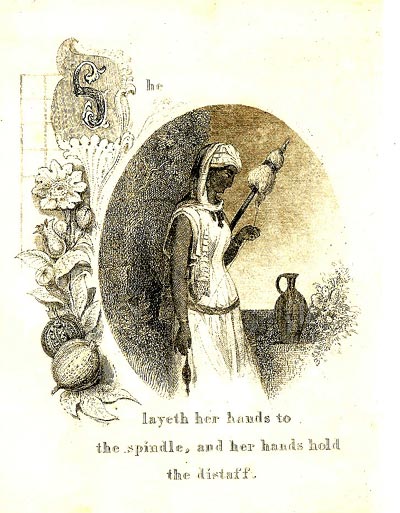*From The Excellent Woman of Proverbs 31 written in 1847 by Anne Pratt (1806-1893)

SHE LAYETH HER HANDS TO THE SPINDLE,
AND HER HANDS HOLD THE DISTAFF.
AND HER HANDS HOLD THE DISTAFF.
Proverbs 31:19

Had not the sacred writer further enlarged upon the character of this woman, had this single praise been uttered of her, it would, to those for whom it was immediately intended, be of itself a high commendation. The Rabbins record an old saying of the Hebrews, that there is no wisdom in a woman but in the distaff; implying, as do the words of the text, that a woman's great praise is her industry. When a Roman lady became a bride, she received many a hint from the marriage ceremony, that she was about to enter on active domestic employment; and again and again, the word thalassio resounded on her ear. This word, which signified the vessel in which were kept the materials for spinning, and the work already spun, reminded her, not only of the spindle and the distaff, to which it might directly refer, but was also significant of the various household occupations, in which the women of ancient days felt it their duty and their honor to excel.
But time has brought its wondrous improvements and great changes, and the well‐constructed spinning machinery of modern days has banished from our cottage‐doors the busy hum of the wheel. The cottager who once turned it gaily round, has now to change her mode of industry, and has only to make up with her needle, into garments, the fabric which she would once have manufactured for herself.
But besides the actual spinning or weaving of the wool and flax, the preparation of these substances gave much employment to the Jewish household. The flax required drying and preparing for use. The wool, after being combed, and picked, and carded, was put up, in round balls, ready for the spindle. It was sometimes left for use with the natural moisture which fresh‐cut wool always yields, and which reminds us of the wool of Gideon's fleeces, out of which, in the Syrian climate, he could wring dew, "even a bowl full of water" (Jdg 6:38). Wool in this state was called plump‐wool; but when the manufacturers were about to make some, of those brilliant garments, whose tints no modern skill can furnish, the wool had to be subjected to the various processes of dyeing.
